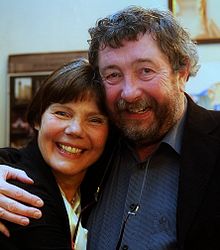Miklós Sugár

Miklós Sugár (born 2 July 1952) is a Hungarian conductor, music educator, and composer.
Life
[edit]Sugár is the son of the composer Rezső Sugár and he was born in Budapest. Sugár studied at the Ferenc Liszt Academy of Music with Kórodi Andrásné and Emilnél Petrovich.[1]
After completing his studies, he took a position from 1978-84 as the Army Art Ensemble Symphony Orchestra conductor. In 1978 he also took a position teaching at the Theater and Film Academy in Budapest, where he worked until 1991. From 1984-88 he led the Békéscsabai Symphony Orchestra, and from 1988-90 worked as an editor for Hungarian Radio's music department. In 1991 he took the position of National Philharmonic's manager. The same year, he was a co-founder of EAR, a contemporary electro-acoustic ensemble. Between 1991–99, he worked with the Alba Regia Symphony Orchestra.[2]
From 1979-87 Sugár was a member of the Hungarian Composers 'Association of Young Composers' Group, and from 1983-87 served as secretary to the organization.
Private life
[edit]He is married to musicologist Zsuzsánna Mindszenty and they have three adult daughters.[3]
Honors and awards
[edit]- 1981, scholarship from the Albert Szirmai Foundation
- 1984-85, Kodály scholarship
- 1985, Budapest Spring Festival, 3rd International Zeneszerzőverseny finishers
- 1989, Arezzo Choral Competition Special Prize-winning composer
- 1991, Hungarian Radio KÓTA művéért's Gloria Award.
- 1991-92, Soros Fellow
- 1991, John von Neumann Society for Competition of Electroacoustic (3 awards)
- 1992, Ferenc Erkel Prize
- 1993, Lanczos-Szekfu Foundation honoree
- 1989, 1990 and 1994, Les Atelier UPIC scholarship, Paris
- 1999, Akademie der Künste Berlin Scholarshi
- 2001, Vox-electronica award as a member of EAR
Discography
[edit]Sugár's works have been recorded and issued on media including:
- Mosaic, Musica agile, Dissolves, Ballad, Chorea, Rencontres, 1988 Hungaroton SLPX 12970 LP
- Concert for Cimbalom, 1993 Preludio PRECD 9304 CD
- Fanfár / Fanfare, 1995 ARITMIA Hungaroton HCD 31 624 CD
- Contemporary Hungarian music for trumpet and harp, 1995 Hungaroton HCD 31 734 CD
- Vizek völgyek harangok / Water, valley, bells, 1997 MR HEAR Studio CD
- Magyar hangtájak / Hungarian Soundscapes, Álmok / Dreams - részletek / excerpts, 1997 MR Rt HEAR Studio CD
- EAR movements: Short story, Fluctus, Models, Percupicsy, Iris, 1999 Hungaroton HCD 31 788 CD
- Lied, Pater noster, 1999 Hungaroton HCD 31 840 CD
- Dreams, 2000 Hungaroton HCD 31 868 CD
- Trio miniatures, 2001 Hungaroton HCD 31 997 CD
- After storm, Songs on verses by Béla Kondor, Luxatio, Three songs on Poems by Morgenstern, No. 2, French songs on Poems by S. Beckett, Miniatures, 2003 Hungaroton HCD 32 180
- Adoramus, Exultate, 2004 Allegro Thaler MZA-069
- Fanfár, 2004 Hungaroton HCD 32251
- Mosaic, Musica agile, Dissolves, Réminiscences, Cloud variations, Ballad, Chorea, Rencontres, 2005 Hungaroton HCD 32326
- Art Duo No. 2, 2005 Hungaroton HCD 32347
- Pages dessinées, Birds of the crater, 2006 Hungaroton HCD 32449
References
[edit]- ^ Tyrrell, John (2001). The new Grove dictionary of music and musicians: Volume 24.
- ^ "Sugár Miklós életútja". Retrieved 16 February 2011.
- ^ "Eötvös Loránd Tudományegyetem Zenei Tanszék". 2016-03-04. Archived from the original on 2016-03-04. Retrieved 2023-06-10.
